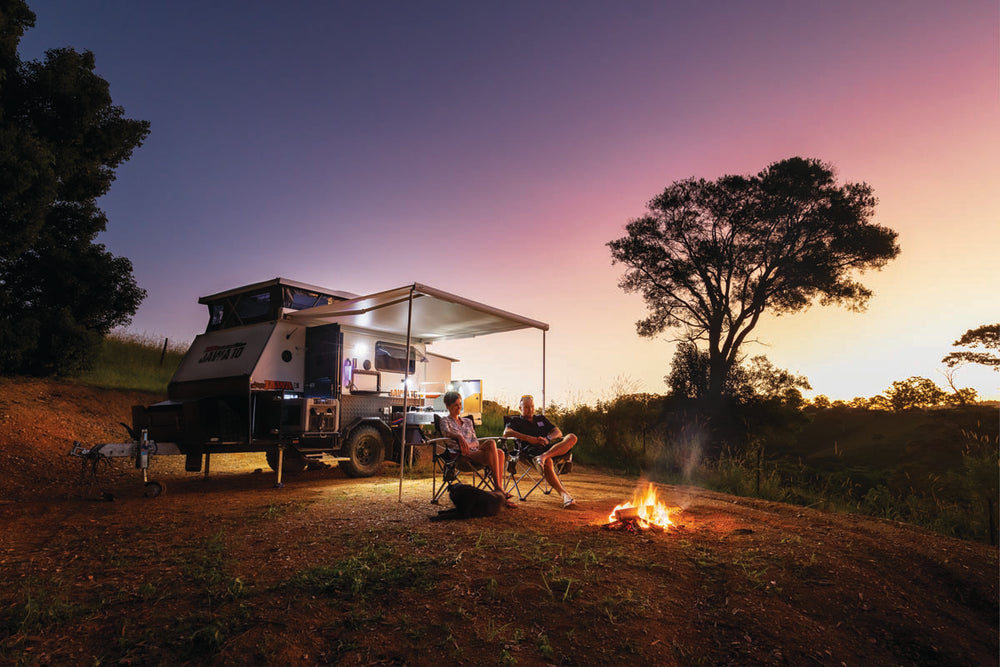How To: Working on the Road
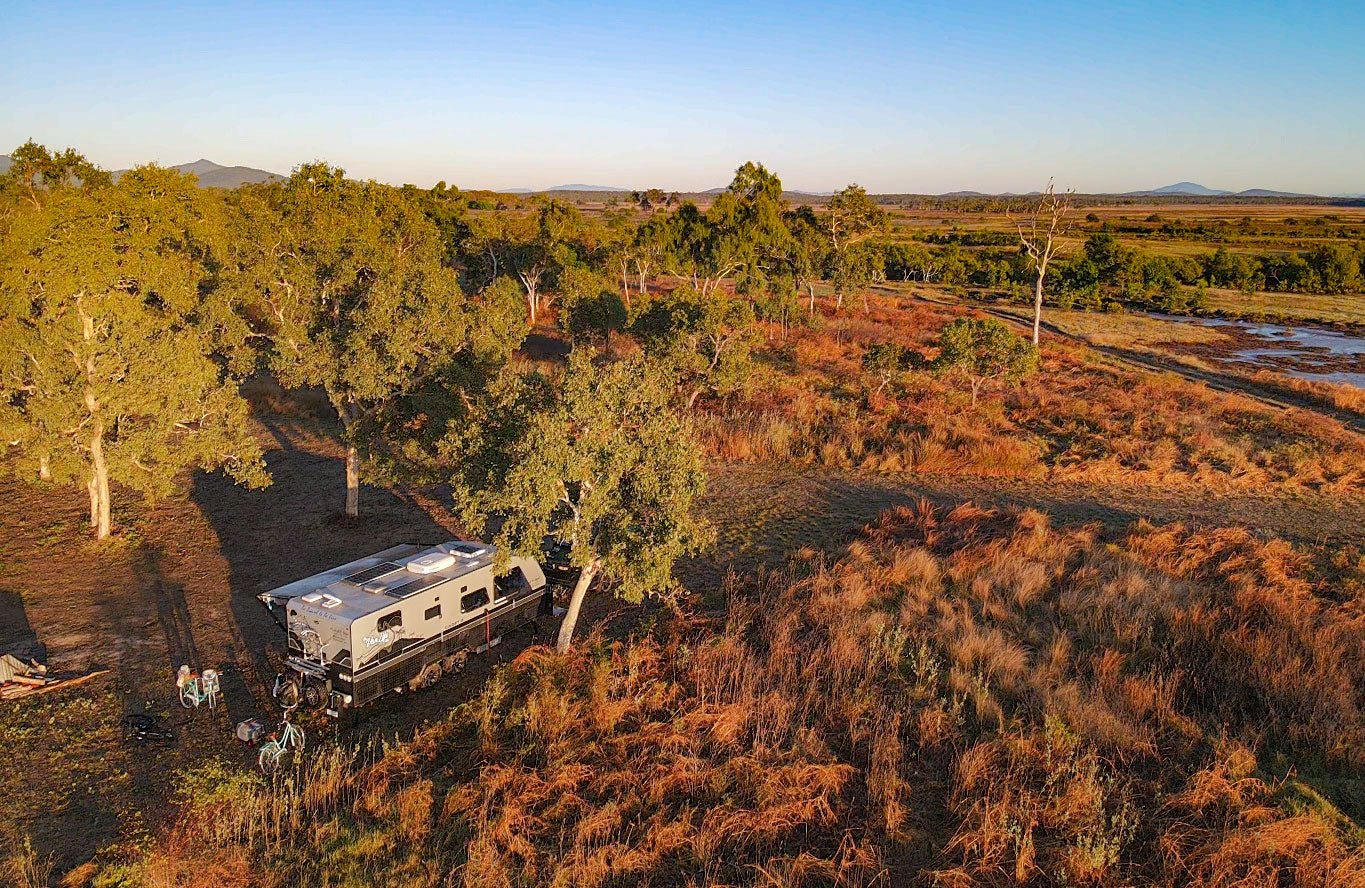
The #vanlife phenomenon has taught younger generations what Grey Nomads already knew – travelling by RV is cool. Now there's a slew of professionals buying vans, motorhomes and converted buses and living on the road full time, working remotely in a full-time job or periodically in seasonal roles as the mood takes them.
Here, we chat with three sets of vanlifers living the good life to see how they have adjusted their setups for not only full-time living in their RV, but for work as well.
SURF’S UP
The pandemic has shown many people that life is short – and the time to get out and see the country is now. This is especially true for Gary Berman and his wife Sheryle, who sold their home on the NSW Central Coast and packed up their surf, skate and streetwear clothing business, named drøm which means to dream in Danish, to hit the road.
Remote working has been proven through lockdowns, especially for those with a ‘desk job’ where all you need is a laptop and reliable internet. But a merchandise business that requires storage, sales, printing and distribution is a different story.

Gary and Sheryle have transitioned their brand from a bricks and mortar store to a mobile business run from their van and tow vehicle, carrying enough stock to sell at markets and to ship to customers via their online store, which is very active.
“Covid-19 hit us pretty badly, like with everybody else, and we just decided, ‘Let's try something different. Life's too short’," he tells Caravan World. “We know there are markets everywhere around Australia, and because we do a lot of online sales, we thought we could do what we do back home on the road.”
The couple’s working setup is impressive. They took about two months’ worth of stock with them to sell at markets and call on suppliers to send more to whichever caravan park they are staying at when they need to top up. The couple carry a printing press with them, and they set it up under the awning to print shirts, hats, hoodies and more with their designs. As their stock levels change, they shift the weight through the van and their tow vehicle to remain evenly distributed.
The pair had run the business together before their travels. Gary does the ordering, the printing, and the accounting side of the business (the latter via a laptop) as well as photography, while Sheryle manages the social media and marketing. Their King Charles cavalier dog, River, is the couple’s caravan companion and business mascot at markets.
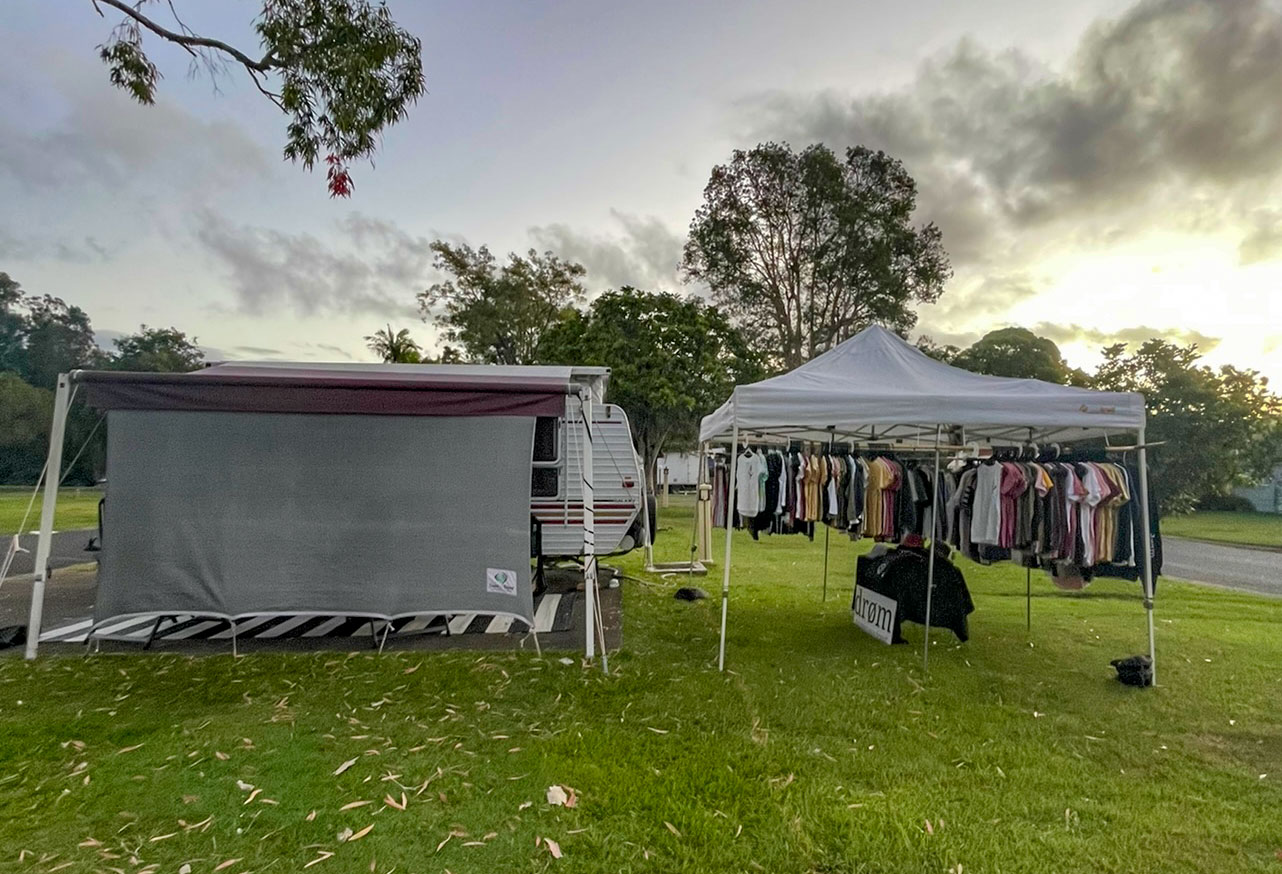
The pair researched markets up the north coast of NSW and into Queensland and decided on a rough itinerary, which was interrupted by the severe flooding earlier this year along the east coast. Yet despite that, they have been to more than 30 towns and sold at about 50 markets as well as setting up a few pop-up stores in local shopping centres.
While rain slowed sales, Gary says life on the road is far less costly.
“You've still got card payments, and you still have car expenses, those sorts of things. But it is a lot less,” he says. “Obviously, we don't have house rent, we don't have shop rent, we don't have electricity. We're just paying rent in the caravan parks.”
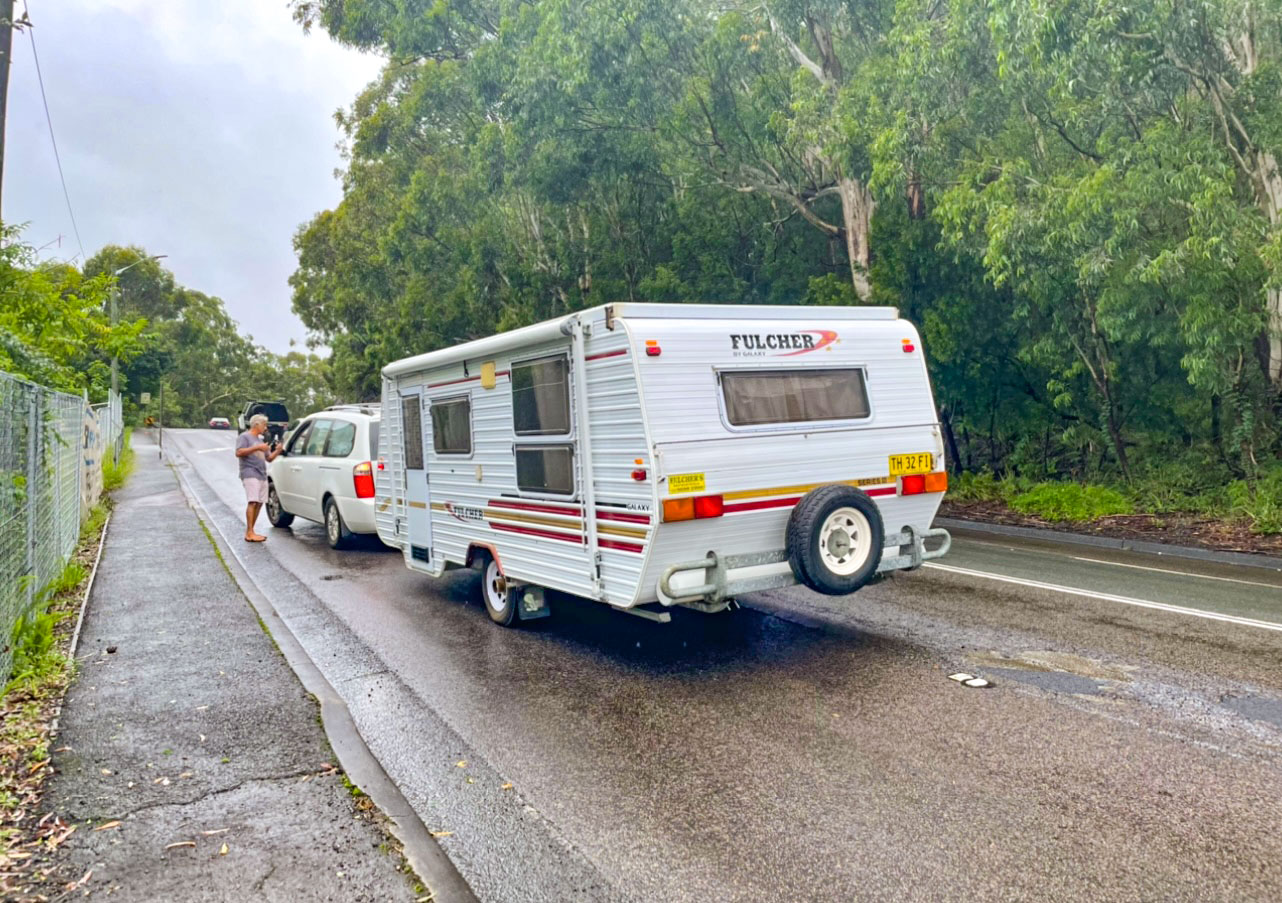
The pair had never owned a caravan before – they had only hired a Winnebago motorhome for a work trip previously – and decided on a 2004 model Galaxy Fulcher pop-up van and Kia Carnival tow vehicle.
“We didn't want something too large as we'd never towed before,” says Gary. “We wanted to give it a try, and it's nice, just big enough, just, I think, large enough as a beginner tower.”
Six months ago, they closed their shop, sold their house and most of their possessions in the process to ensure they didn’t have a “backup plan” as Gary calls it. And the adjustment? So far, so good.
“I must say, after four days, we were in Port Macquarie and we're sitting out after a few people helped us to set up our awning, which we’d never done before, and we looked at each other, and we thought, ‘This isn't too bad’,” he says. “We were very surprised at how we didn't need a whole lot of stuff, and we still haven't needed it.”
And his advice for others considering a similar life change?
“Just do it, and then you can look back later and have no regrets,” he says. “Working on the road is the best thing in terms of what we want to do. We stay two or three weeks in each place and it's a great way to work.”

CONVERSION TO A ‘T’
Adventure-loving couple Matt O’Brien and Ally Beagley are living the work-on-the-road dream, spending the snow season in their second motorhome conversion in the NSW ski fields.
Matt works as a ski and snowboard hire technician in Jindabyne, and Ally is a conveyancer working on a remote basis for a Victorian firm, while also studying full time for a Bachelor of Business through Swinburne University.
The pair had decided to make the leap to travel in January 2020, and Ally had resigned her role, but lockdowns put a dampener on plans. But, as her office was forced to work remotely, there was a silver lining.
“My employer approached me and asked if I would consider continuing to work ‘on the road’ since we now had the means to,” she says. “It worked well for the both of us, so I accepted this. In a way I am thankful for Covid-19 restrictions as without the lockdown I wouldn’t have been able to keep my position.”
After much discussion, they decided a motorhome conversion was the best option for long-term travel.

“We wanted to travel, to see Australia, and we both enjoyed camping. However, the packing, setting up and pack down was getting pretty tiresome,” says Matt. “So, the idea of a self-contained van where you can just park up with no setup was pretty appealing.”
Their rig is definitely impressive – and Matt spent five months doing all the work bar the gas fit out. It’s a 2012 Iveco Daily XLWB, and at 7.2m long and 2.9m high it’s an upgrade from their first van, a Toyota HiAce Commuter. It has a queen bed, kitchen with oven, grill and stove and 2.2m bench space, large fridge/freezer, microwave, composting toilet, heating and cooling (even off-grid air-conditioning), a bench seat with swivel table and extendable monitor and TV.

Matt built the custom-sized shower from scratch using lightweight marine ply and 3mm wet area PVC panels for waterproofing. A single 9kg gas bottle feeds cooking and the instant hot water system, while a cavernous under-bed storage area hosts their adventure toys – mountain bikes, inflatable stand up paddle boards, skateboards, surfboards, multiple snowboards and more.
Ally’s workstation for her two laptops – one for work and one for study – is a clever design in such a small space. She has a second monitor on a triple-arm bracket which allows it to swing into position when she is on the bench seat. When it is collapsed, it locks into position out of the way so the pair can use the area for cooking, dining and also when travelling. It’s powered through AC with the van’s inverter.

“Anyone who has worked with two screens can back me up when I say you just can’t go back to working with one screen!” says Ally. “In our previous van I was constricted to working on the bed with just my laptop and this was pretty uncomfortable. The work and study setup was an important factor of the build.”
In terms of internet access for work, Ally upgraded her phone plan to access 300GB per month with Telstra for hotspotting. They have a Falcon 43in 4K smart TV, gaming consoles for rainy days and plenty of battery power to support it all thanks to a 560Ah lithium lifePO4 battery. That’s recharged via 750W of roof-mounted solar panels, and a 40A DC-DC charger for charging when driving.
The motorhome setup served to also leverage work for Matt during the ski season.
“There is a massive shortage of staff here this season due to losing the international staff and a huge accommodation shortage as a result of an increase in investment properties in the area (Airbnbs) taking up opportunities for affordable shared staff housing,” he says. “Living in a motorhome allowed me to secure a job as a result of not needing accommodation.”
So, what’s next after the ski season? Apart from some back country snowboard exploration and mountain climbing planned for the Canberra area, the world is their oyster.

“No solid plans and we will just see where things take us!” they say. “People are always telling us they’re jealous that we are always on ‘holidays’, which for the most part we are, however there are a few sacrifices you will have to make as it’s a lifestyle. But if you have ever considered it, we think you should!”
FAMILY ENTREPRENEURS
Michael and Steph Van Ginneken also decided life was too short, and completely changed careers before they sold up and began touring the country with their daughters Scarlett, 11, and Mila, two.
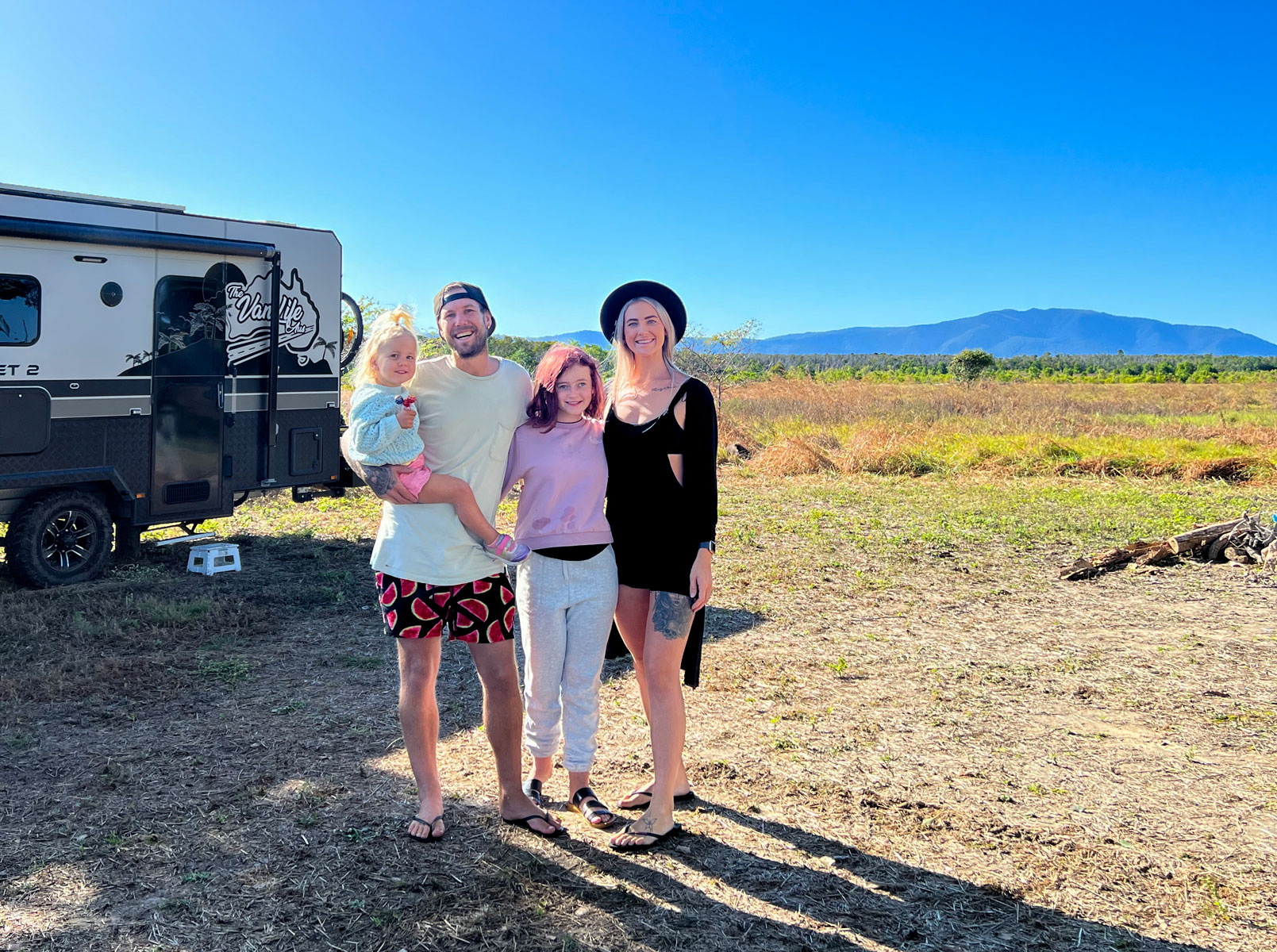
Steph had run her own beauty business, which was hit hard by Victoria’s lockdowns, while Michael was under a lot of stress and working long hours away from the family in his construction job.
Looking for a change, they came across Enagic, a Japanese company that specialises in medical grade water ionisers. They now partner with Enagic to educate consumers about their products and distribute them completely online without having to stock inventory. In Michael’s words, “What’s one thing we all need to survive? water”. The couple also onboard, train and mentor other entrepreneurs into the Enagic business.
“They've been around for almost 50 years and that gave me satisfaction that we were partnering with the right company to be able to promote a great product that is also based around our values of health and vitality,” says Michael.
Michael and Steph say their transition to running their own sales business together has been helped by their shared passion for the product, communication and marketing skills they had honed in previous roles – but the real motivation was the flexibility the opportunity offered, and the chance to make a huge lifestyle change.
“So, when we first started in Enagic, it took us about six months before we looked at each other and said, ‘we could take this on the road’,” says Steph. “We can see a completely different future for ourselves. It was the idea of just getting out and traveling and just letting our kids be kids and actually having the freedom to be able to do that.”
They put in an order for a Kokoda Cadet 2 van, selected for its ‘airy’ layout thanks to the door at the back. There are bunks for the kids and a “must-have” ensuite for the family. They chose the brand after researching what other full-time travellers had purchased, and found Kokoda was a firm favourite. Their tow vehicle is a Range Rover Sport.

Around 15 months after making the decision, the pair sold their home and most of their possessions, taking only a minimal number of belongings with them. Michael says this wasn’t really hard to do, and being minimalists is “refreshing”.
“There's a weight off your shoulders, that sort of pressure of maintaining a house and the kids' rooms,” he says. “Life is a lot simpler. We love to travel and our business has become quite successful so we can sustain living on the road quite easily.”

The pair have a simple tech setup for their business – they need a laptop and good wi-fi. They split their work in between family and travel time – often working for a few hours in the early morning when the kids are still asleep – and juggle childcare and home-schooling responsibilities with emails, training and meetings.
“Our work setup is definitely not sophisticated,” laughs Steph. “We either will be sitting on our queen bed at 6am, just typing away, or sit down at the dining table. Or when it's the warmer nights, we actually will come outside and work outside under the awning. So, it really just depends on the day. If we're at a kid's play centre, we'll take the laptop with us.”

Their business tools include a laptop, phones, and iPads as well as a GoPro and drone to create social media and marketing content for their business and Facebook page, ‘Michael X Steph - The Van Life Aus’. Reliable internet is also key, and the pair have a portable modem.
The family are planning to head to Western Australia for an extended period but are happy that they have the flexibility to change their minds if they feel like it.
“We don’t rush off because we don't need to – we don't have a boss telling us that we need to be back at work on Monday,” says Michael.
Follow these travellers’ adventures on social media.
Gary and Sheryle Berman, drøm Clothing (Website)
Matt O’Brien and Ally Beagley (Instagram)
Michael and Steph Van Ginneken, The Van Life Aus (Facebook)
Related Articles:
HOW TO ENTERTAIN CHILDREN ON A CAMPING TRIP?
BEGINNER CARAVANNING GUIDE - WHAT TO DO WHEN YOU’RE STARTING OUT




